- Home
- Joe R. Lansdale
Hap and Leonard Ride Again
Hap and Leonard Ride Again Read online
Advance Praise for Hap and Leonard
“Seven laid-back adventures, one of them brand new, for 'freelance troubleshooter' and good old boy Hap Collins and his gay black Republican partner Leonard Pine. . . . No one currently working the field demonstrates more convincingly and joyously the deepaffinity between pulp fiction and the American tall tale."
——Kirkus
“As Mr. Lansdale might say, 'This was more fun than rolling down a hill with a bunch of armadillos.'”
—Horror Novel Reviews
“. . . it’s great to have all of these wonderful stories together in one nifty volume”
—Horror Drive-In
“Highly entertaining”
——Sons of Spade
Praise for Joe R. Lansdale’s Hap and Leonard series
“Hap and Leonard function as a sort of Holmes and Watson—if Holmes and Watson had had more lusty appetites and less refined educations and spent their lives in East Texas. . . . Not only funny, but also slyly offers acute commentary on matters of race, friendship and love in small-town America.”
—New York Times
“Lansdale reveals the human condition—our darkest secrets and our proudest moments, all within the unlikely confines of an East Texas adventure featuring the two scruffiest protagonists in modern crime fiction.”
—Booklist
“Hilarious. . . . Addictively scarfable. . . . Lansdale excels at dialogue, especially Hap and Leonard’s lewd insult-a-thons. . . . Two thumbs-up, and pardon the barbecue smears.”
—Texas Monthly
“As usual, the dialogue is deadpan tart and the action extreme but convincing. . . . Lansdale once again proves he’s the East Texas master of redneck noir.”
—Publishers Weekly (on Hyenas)
Praise for Joe R. Lansdale
“There’s no bullshit in a Joe Lansdale book. There’s everything a good story needs, and nothing it doesn’t.”
—Christopher Moore, author of Secondhand Souls
“[Joe Lansdale has] a folklorist’s eye for telling detail and a front-porch raconteur’s sense of pace . . . a considerable literary intelligence at work.”
—New York Times Book Review
“Joe Lansdale is a born storyteller.”
—Robert Bloch, author of Psycho
“Joe Lansdale simply must be read.”
—Robert Crais, author of the Elvis Cole and Joe Pike novels
“Read Joe Lansdale and see the true writer’s gift.”
—Andrew Vachss, author of Shockwave
“Among the best fiction writers in America today, Joe Lansdale turns on the juice and cuts the damn thing loose. Enjoy the ride!”
—Kinky Friedman, author of Ten Little New Yorkers
“Hunter S. Thompson meets Stephen King.”
—Charles de Lint, author of The Onion Girl
“A master at taking a simple everyday event and turning reality upside down.”
—Mystery Scene
“Lansdale reaches the reader on a gut level . . . a terrific writer.”
—Ellery Queen’s Mystery Magazine
Hap and Leonard Ride Again
Copyright © 2016 by Joe R. Lansdale
This is a collected work of fiction. All events portrayed in this book are fictitious and any resemblance to real people or events is purely coincidental. All rights reserved, including the right to reproduce this book or portions thereof in any form without the express permission of the author and the publisher.
“An Appreciation of Joe R. Lansdale” copyright © 2016 by Michael Koryta
“Joe R. Lansdale, Hap and Leonard, and Me” copyright © 2016 by Bill Crider
“An Interview with Joe R. Lansdale, His Own Self ” copyright © 2016 by Rick Klaw
“The Care and Feeding and Raising Up of Hap and Leonard” copyright © 2016 by Joe R. Lansdale
Interior and cover design by Elizabeth Story
Interior photographs courtesy of SundanceTV LLC; copyright © 2015 James Minchin III and Hilary Gayle
Ebook design by James DeMaiolo
Tachyon Publications LLC
1459 18th Street #139
San Francisco, CA 94107
415.285.5615
www.tachyonpublications.com
[email protected]
Series Editor: Jacob Weisman
Editor: Richard Klaw
Project Editor: Jill Roberts
EPUB: 978-1-61696-222-7 | MOBI: 978-1-61696-223-4 | PDF: 978-1-61696-224-1
First Edition: 2016
“Veil’s Visit” copyright © 1999 by Joe R. Lansdale and Andrew Vachss. First appeared in Veil’s Visit: A Taste of Hap and Leonard (Subterranean Press: Burton, Michigan).
“Death by Chili” copyright © 1999 by Joe R. Lansdale. First appeared in Veil’s Visit: Taste of Hap and Leonard (Subterranean Press: Burton, Michigan).
“A Bone-Dead Sadness” copyright © 2012 by Joe R. Lansdale. First appeared in Act of Love (Subterranean Press: Burton, Michigan).
“Not Our Kind” copyright © 2016 by Joe R. Lansdale. First appeared in Hap and Leonard (Tachyon Publications: San Francisco).
“The Oak and the Pond” copyright © 2016 by Joe R. Lansdale. First appearance.
“The Boy Who Became Invisible: A comic book script based on the story of the same name” copyright © 2016 by Joe R. Lansdale. First appearance.
“Joe R. Lansdale Interviews Hap Collins and Leonard Pine” copyright © 1999 by Joe R. Lansdale. First appeared in Veil’s Visit: A Taste of Hap and Leonard (Subterranean Press: Burton, Michigan).
HAP AND LEONARD RIDE AGAIN
Also by Joe R. Lansdale
Hap and Leonard mysteries
Savage Season (1990)
Mucho Mojo (1994)
The Two-Bear Mambo (1995)
Bad Chili (1997)
Rumble Tumble (1998)
Veil’s Visit: A Taste of Hap and Leonard (1999)
Captain Outrageous (2001)
Vanilla Ride (2009)
Hyenas (2011)
Devil Red (2011)
Dead Aim (2013)
Honky Tonk Samurai (2016)
The Drive-In series
The Drive-In: A “B” Movie with Blood and Popcorn, Made in Texas (1988)
The Drive-In 2: Not Just One of Them Sequels (1989)
The Drive-In: A Double-Feature Omnibus (1997)
The Drive-In: The Bus Tour (2005)
The Complete Drive-In (2009, omnibus)
Ned the Seal
Zeppelins West (2001)
Flaming London (2005)
Flaming Zeppelins: The Adventures of Ned the Seal (2010)
Other novels
Act of Love (1981)
Texas Night Riders (1983, as Ray Slater)
Dead in the West (1986)
The Magic Wagon (1986)
The Nightrunners (1987)
Cold in July (1989)
Batman: Captured by the Engines (1991)
Tarzan: The Lost Adventure (1995,with Edgar Rice Burroughs)
The Boar (1998)
Freezer Burn (1999)
Waltz of Shadows (1999)
Something Lumber This Way Comes (1999)
The Big Blow (2000)
Blood Dance (2000)
The Bottoms (2000)
A Fine Dark Line (2002)
Sunset and Sawdust (2004)
Lost Echoes (2007)
Leather Maiden (2008)
All the Earth, Thrown to the Sky (2011)
The Ape Man’s Brother (2012)
Edge of Dark Water (2012)
Hot in December (2013)
The Thicket (2013)
Black Hat Jack (2014)
Prisoner 489 (2014)
Paradise Sky (2015)
Fender Lizards (2015)
For Lowell Northrop.
Thanks for your determination and dedication.
Contents
An Appreciation of Joe R. Lansdale
by Michael Koryta
Joe R. Lansdale, Hap and Leonard, and Me
by Bill Crider
Veil's Visit
(with Andrew Vachss)
Death by Chili
A Bone-Dead Sadness
Not Our Kind
The Oak and the Pond
The Boy Who Became Invisible
(A comic book script based on the story of the same name)
Joe R. Lansdale Interviews Hap Collins and Leonard Pine
An Interview with Joe R. Lansdale, His Own Self
The Care and Feeding and Raising Up of Hap and Leonard
About the Author
An Appreciation of Joe R. Lansdale
by Michael Koryta
Different writers have different goals, but there are—or should be—some constants. Here are a few: memorable characters, original voice, stories that make the reader feel something.
I can think of many writers who have achieved those things. Then I think of Joe Lansdale, who has achieved them, lapped them, and redefined them. This wonderful collection of the tales of Hap Collins and Leonard Pine is—somehow—just a taste of the Lansdale oeuvre, but it is a delicious one.
Memorable characters? Meet Hap, a former social activist and a “white trash rebel,” and Leonard, a black, gay, Vietnam veteran and Republican voter. In the hands of many writers, this mix would be disastrous, an overwrought pairing designed to conceal inauthentic storytelling. In Lansdale’s hands, not only does the duo work, but they seem natural together, playing off each other in beautiful fashion. The dialogue exchanges between these two, as typified in the novella “Hyenas,” are filled with more gems than a jewelry store:
“Well,” Leonard said, “in cases like that, the gut is often right. We still know a shark when we see one. That’s why we crawled out of the water and became men in the first place. Only thing is, some of the sharks crawled out after us.”
“That would be the lawyers,” I said.
There’s a smile on every page and an outright howler on every other, but it’s in the momentum of the stories that I’ve always found the true genius. Hap and Leonard do a lot of chatting, sure, a unique patter that seasons their adventures, but they’re always in motion, and the dialogue is truly in service of the story, not the other way around. A lot of writers with a gifted ear for dialogue—and Joe has one of the best ears around—can get caught in a trap built by their own abilities, creating wandering exchanges that don’t do much except show off. Joe’s stories are constantly in motion, and the dialogue reflects that:
“Ready?” I said.
“I was born ready.” Leonard said.
“Scared?”
“I don’t get scared.”
“Bullshit.”
“Okay, I’m a little scared. Let’s get it done before I get more scared.”
We started walking.
There you go—they started walking. They’re going somewhere, these two, and you’ll find yourself turning pages at paper-cut speed to keep up, watching a remarkable feat where Joe Lansdale balances violence and humor, tension and howling laughter, in a way that feels organic, unforced, and perfectly original. Each story or novel seems to begin in mid-sentence, with the sense that you’d best hustle along and catch up or you’re going to be left behind. There’s a confidence to the prose that is simply masterful, a trust in both voice and reader.
There is also—and I think this is overlooked in the Hap and Leonard stories—a hell of a lot of wisdom. Amid the fun and between the punches, there’s the voice of a writer who at times resembles Twain himself—and, yes, I really mean that, and, no, I do not say it lightly or easily.
In “The Boy Who Became Invisible,” a story of Hap in his early years, Lansdale does more than make the reader feel something—he makes you hurt. The early pages, a story of seemingly casual schoolyard bullying, show the making of the man we will know as Hap.
That hit me pretty hard, but I’m ashamed to say not hard enough, Hap thinks of his own role, his moral acquiescence to something beneath him. His one-time friend, Jesse, is becoming a target of ridicule, and what Lansdale has to say about it speaks not just to schoolyard torment but to the dangers of group think, of what happens when you compromise personal integrity to just go along with the flow. When the kids laugh at Jesse, you’ll hurt for him, and hurt for Hap, I assure you. But better than that, and more impressive—you’ll hurt because of Hap. And because of yourself. That is when the character-reader bond has reached an emotional height, and it’s a special experience.
When Jesse spoke to me, if no one was looking, I would nod.
We all carry memories of shame, embarrassment over our own conduct. Lansdale isn’t directing you to examine them; he’s too good a writer for that. The reflection is a product of the story, and all the great things—laughter, fear, profundity—that come from his work will always come from the story. While many writers repeat the show don’t tell cliché, Joe Lansdale lives it. If you don’t believe me, wait until you get to the last line of “The Boy Who Became Invisible.” See how long that one lingers.
Again, this is merely a taste of a remarkable body of work. That’s staggering to consider, and inspiring.
I just have a knack to aim at something and hit it, Hap reflects on his shooting ability in “Hyenas,” and that’s the way reading Lansdale feels—effortless talent, a knack so natural that he just leans back in his chair, puts his feet up, and spins a yarn. Meet him in person, and you’ll leave thinking the same thing, that this stuff comes easily, that he shares great storytelling as naturally as most of us exhale.
And I’m here to tell you it’s bullshit.
Does Joe Lansdale, like Hap Collins, have one hell of a lot of natural talent, a “knack” for hitting stories out of the park and dropping one-liners that are the envy of professional comedians? Sure. Does it come easily? No. It comes from a lifetime of dedicated work, a man committed to craft, a man so aware of how story works and why that he can fool us into thinking it’s effortless. William Blundell once said, “Easy writing makes hard reading. Hard writing makes easy reading.”
I think of that line when I read Hap and Leonard, and when I read Joe Lansdale in general. I think about how smooth these stories go down, each line so razor-edged, each action scene so perfectly choreographed, and I think—this guy has worked awfully hard so the reader doesn’t have to.
You have in your hands a collection by a master. Enjoy it, treasure it, and as you breeze through with a smile on your face and some head-nodding over bits of polished wisdom, be damn grateful that Joe Lansdale has put in the work to deliver it so well. I assure you, the writing is not easy.
But the reading? It’s an absolute joy. You’d best get started. Hap and Leonard are already in motion, I assure you, and you’re going to want to catch up.
Michael Koryta is the New York Times bestselling author of eleven suspense and horror novels.
Joe R. Lansdale, Hap and Leonard, and Me
by Bill Crider
I like to tell people that I’m so old I can remember when Joe Lansdale said he didn’t think he’d ever write a series. He may deny he said that, and I can’t prove that he did because I wasn’t wearing a wire at the time. But that’s the way I remember it, and I should put a disclaimer in right here. Everything that I remember is suspect and might not even be true. I’ll paraphrase Mark Twain here (I’ll get back to Twain later) and say that my memory is so good that I can remember things that didn’t even happen. Those things are true to me, however, and I think it’s worth setting some of them down so that future literary critics can mine my comments for information. They’re a little bit of the history of Texas writing from the perspective of someone who was around to witness it, whether his mem
ory is reliable or not.
Let me start from the beginning.
I first met Joe R. Lansdale on April Fools Day back in 1979. He may not recall that, either, but I’m certain on this point. It was probably an appropriate day for us to meet, too, though I thought nothing about it at the time. We were both at the AggieCon X, a science-fiction convention at Texas A&M University. The guests of honor that year were Theodore Sturgeon and Boris Vallejo. Wilson Tucker was the toastmaster, and he told us that the War of 1812 was fought in 1814. You could look it up.
Neither Joe nor I was a well-known writer at the time. I’d published pretty much nothing except a lot of reviews of crime fiction and a few essays about it in various fanzines. Joe might well have been selling fiction and nonfiction by that time, but it wasn’t anything anybody would have heard of. As incredible as it may seem, some of it might not even have been reprinted. However, in spite of his relative obscurity at the time, I’d seen Joe’s name attached to a few reviews and letters in some of the same fanzines I was publishing in, primarily one called The Mystery FANcier, and because he was from Texas, his name stuck with me.
I didn’t cross Joe’s path during the convention itself, or if I did, I don’t remember it. On the final day of the con, my late wife, Judy, and I were in the Memorial Student Center where the convention was held in those days. We were getting ready to leave and had headed back to our room to get our luggage. As we walked down a hallway near one of the entrances to the dealers’ room (I could take you to the exact spot even today), we stopped near a young man and woman. I was trying to decide whether to make one final run through the dealers’ room, and I didn’t really notice the man because the woman was (and still is) much better looking. Judy told me to forget the dealers’ room, and we were about to move on when I happened to glance at the man’s name tag and saw that he was claiming to be Joe Lansdale.

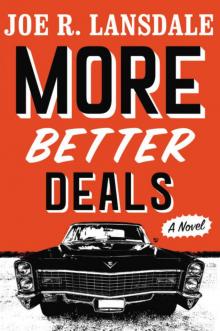 More Better Deals
More Better Deals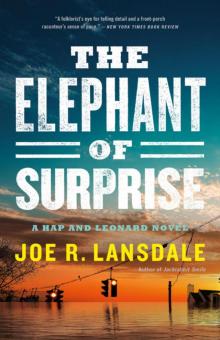 The Elephant of Surprise
The Elephant of Surprise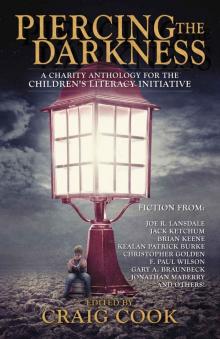 Piercing the Darkness: A Charity Horror Anthology for the Children's Literacy Initiative
Piercing the Darkness: A Charity Horror Anthology for the Children's Literacy Initiative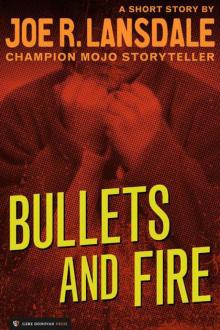 Bullets and Fire
Bullets and Fire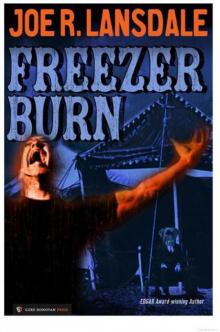 Freezer Burn
Freezer Burn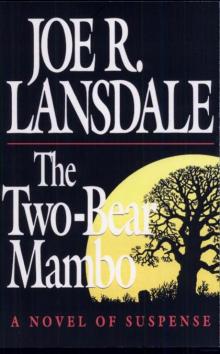 The Two-Bear Mambo
The Two-Bear Mambo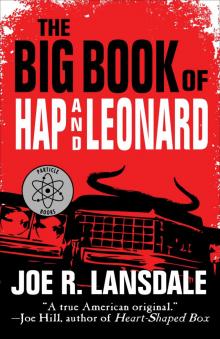 The Big Book of Hap and Leonard
The Big Book of Hap and Leonard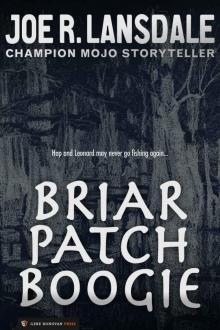 Briar Patch Boogie: A Hap and Leonard Novelette
Briar Patch Boogie: A Hap and Leonard Novelette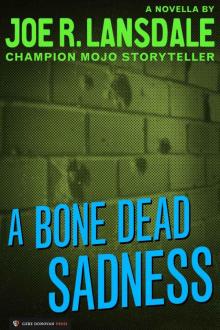 A Bone Dead Sadness
A Bone Dead Sadness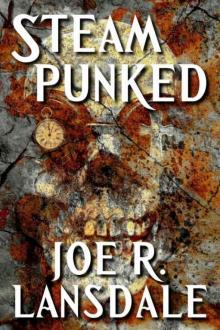 Steampunked
Steampunked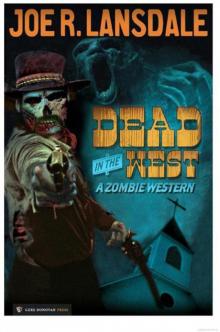 Dead in the West
Dead in the West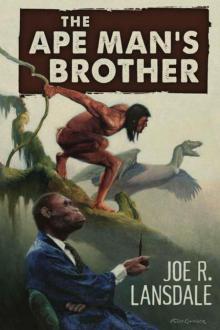 The Ape Man's Brother
The Ape Man's Brother The Bottoms
The Bottoms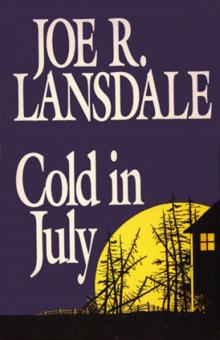 Cold in July
Cold in July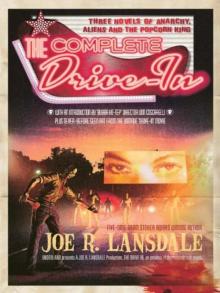 The Complete Drive-In
The Complete Drive-In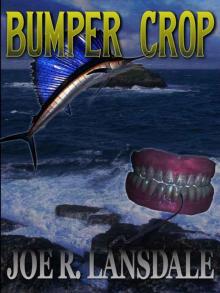 Bumper Crop
Bumper Crop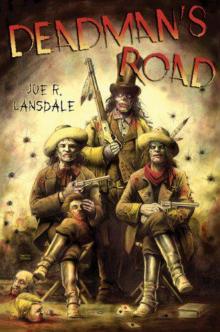 Deadman's Road
Deadman's Road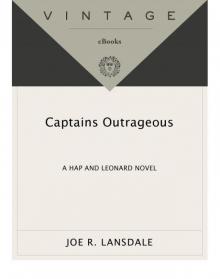 Captains Outrageous
Captains Outrageous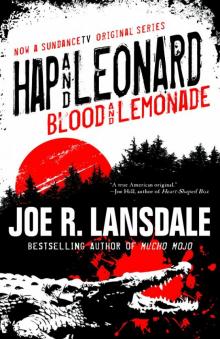 Hap and Leonard: Blood and Lemonade
Hap and Leonard: Blood and Lemonade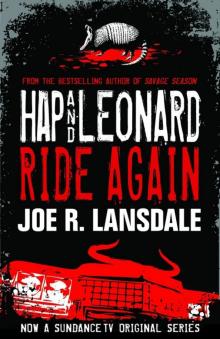 Hap and Leonard Ride Again
Hap and Leonard Ride Again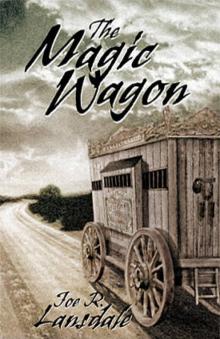 Magic Wagon
Magic Wagon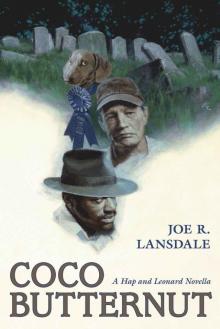 Coco Butternut
Coco Butternut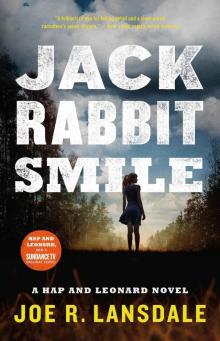 Jackrabbit Smile (Hap and Leonard)
Jackrabbit Smile (Hap and Leonard)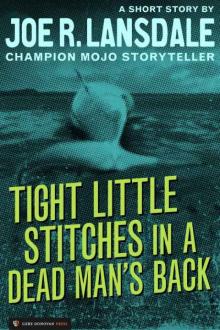 Tight Little Stitches in a Dead Man's Back
Tight Little Stitches in a Dead Man's Back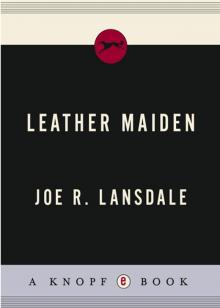 Leather Maiden
Leather Maiden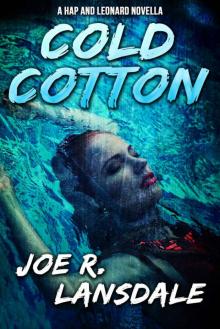 Cold Cotton: A Hap and Leonard Novella (Hap and Leonard Series)
Cold Cotton: A Hap and Leonard Novella (Hap and Leonard Series)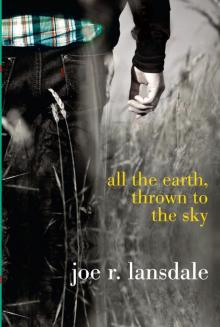 All the Earth, Thrown to the Sky
All the Earth, Thrown to the Sky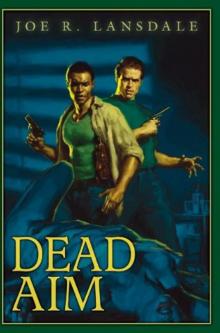 Dead Aim
Dead Aim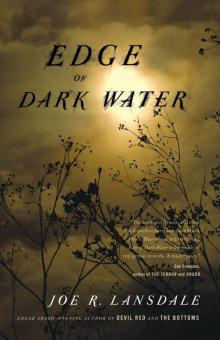 Edge of Dark Water
Edge of Dark Water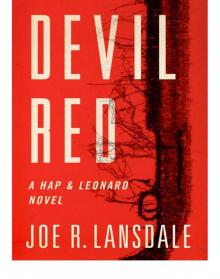 Devil Red
Devil Red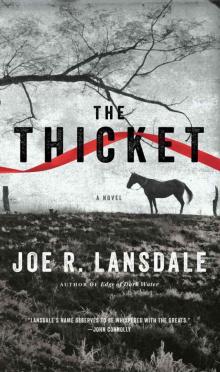 The Thicket
The Thicket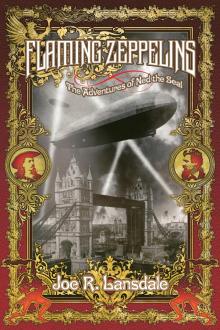 Flaming Zeppelins
Flaming Zeppelins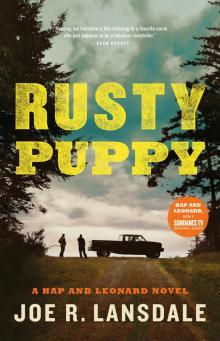 Rusty Puppy
Rusty Puppy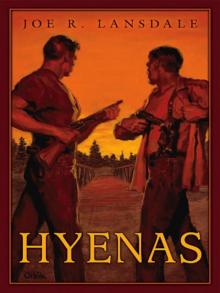 Hyenas
Hyenas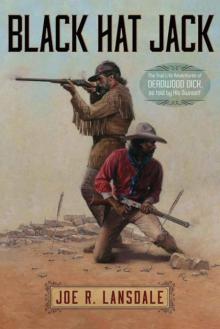 Black Hat Jack
Black Hat Jack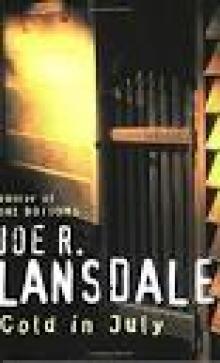 Rare Lansdale
Rare Lansdale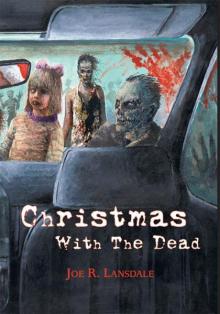 Christmas With the Dead
Christmas With the Dead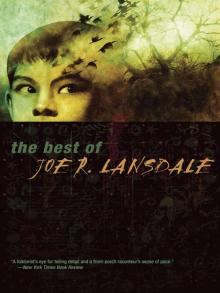 The Best of Joe R. Lansdale
The Best of Joe R. Lansdale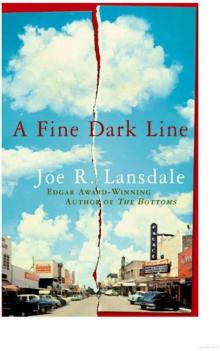 A Fine Dark Line
A Fine Dark Line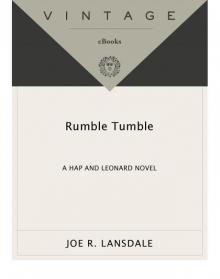 Rumble Tumble
Rumble Tumble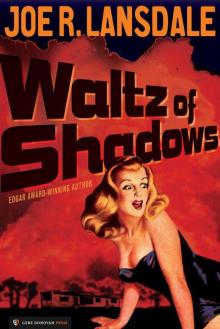 Waltz of Shadows
Waltz of Shadows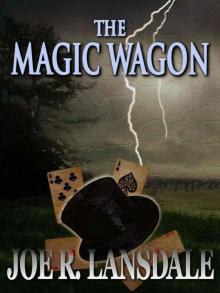 The Magic Wagon
The Magic Wagon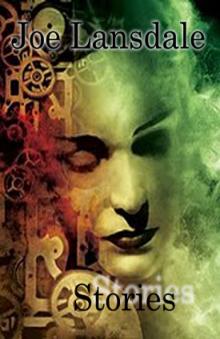 Stories (2011)
Stories (2011)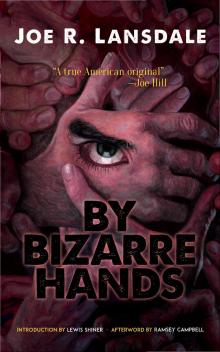 By Bizarre Hands
By Bizarre Hands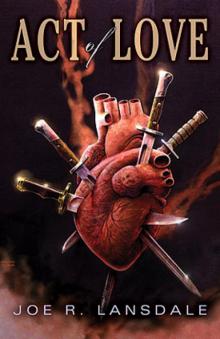 Act of Love (2011)
Act of Love (2011)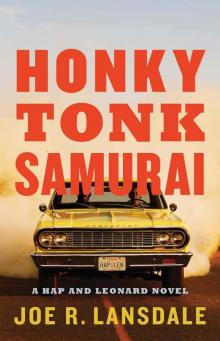 Honky Tonk Samurai (Hap and Leonard)
Honky Tonk Samurai (Hap and Leonard)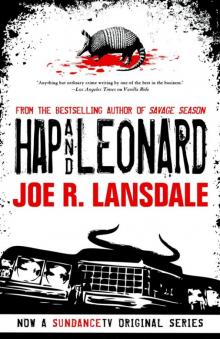 Hap and Leonard
Hap and Leonard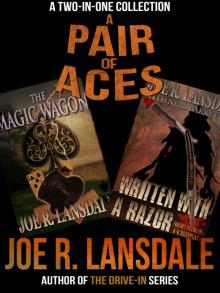 A Pair of Aces
A Pair of Aces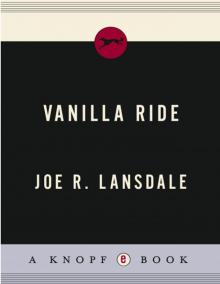 Vanilla Ride
Vanilla Ride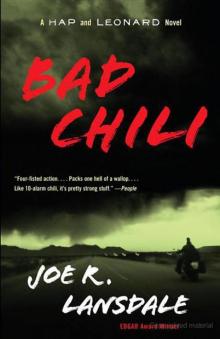 Bad Chili
Bad Chili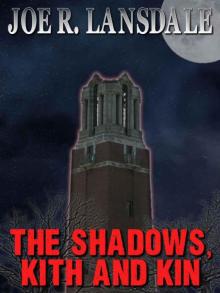 The Killer's Game
The Killer's Game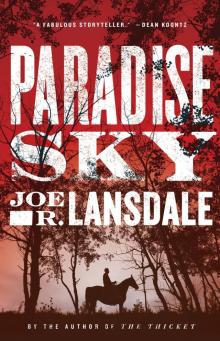 Paradise Sky
Paradise Sky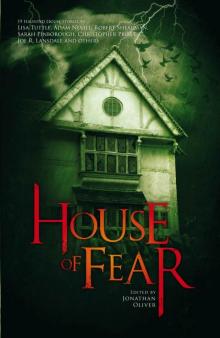 House of Fear
House of Fear Lost Echoes
Lost Echoes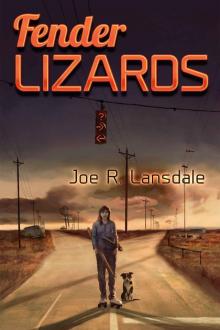 Fender Lizards
Fender Lizards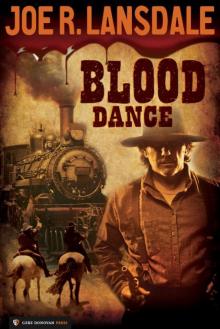 Blood Dance
Blood Dance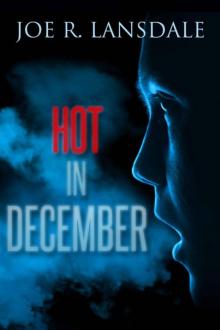 Hot in December
Hot in December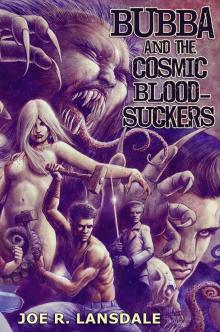 Bubba and the Cosmic Blood-Suckers
Bubba and the Cosmic Blood-Suckers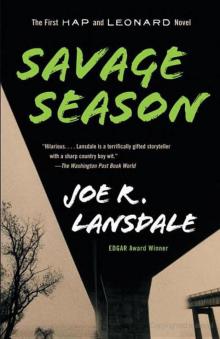 Savage Season
Savage Season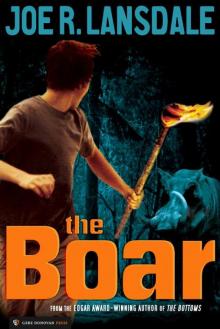 The Boar
The Boar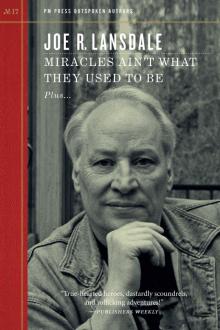 Miracles Ain't What They Used to Be
Miracles Ain't What They Used to Be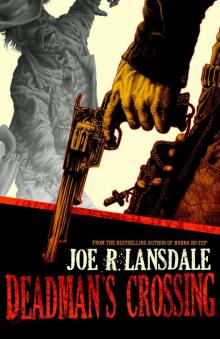 Deadman's Crossing
Deadman's Crossing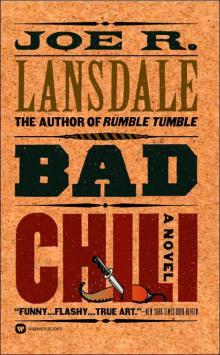 Bad Chili cap-4
Bad Chili cap-4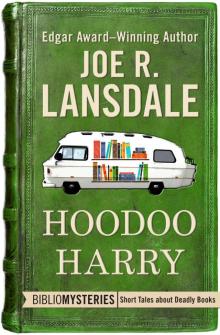 Hoodoo Harry
Hoodoo Harry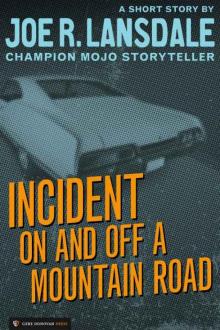 Incident On and Off a Mountain Road
Incident On and Off a Mountain Road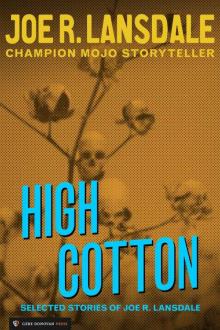 High Cotton: Selected Stories of Joe R. Lansdale
High Cotton: Selected Stories of Joe R. Lansdale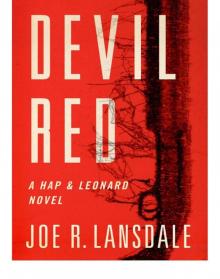 Devil Red cap-8
Devil Red cap-8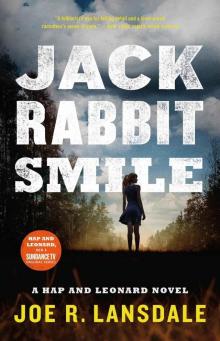 Jackrabbit Smile
Jackrabbit Smile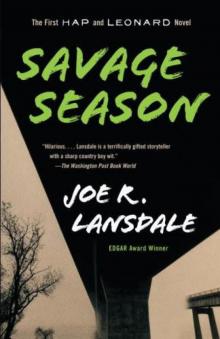 Savage Season cap-1
Savage Season cap-1 Sunset and Sawdust
Sunset and Sawdust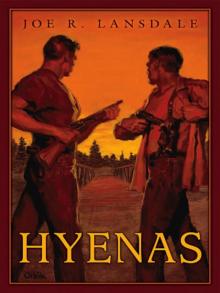 Hyenas cap-10
Hyenas cap-10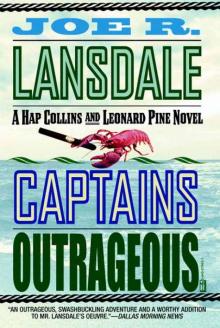 Captains Outrageous cap-6
Captains Outrageous cap-6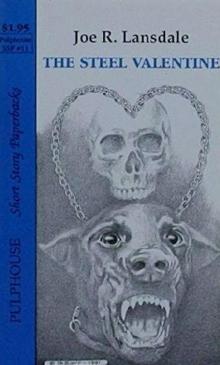 The Steel Valentine
The Steel Valentine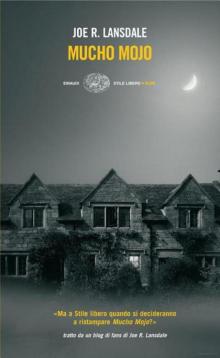 Mucho Mojo
Mucho Mojo Vanilla Ride cap-7
Vanilla Ride cap-7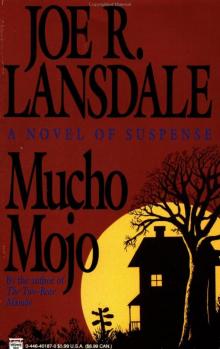 Mucho Mojo cap-2
Mucho Mojo cap-2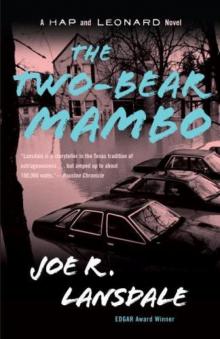 The Two-Bear Mambo cap-3
The Two-Bear Mambo cap-3